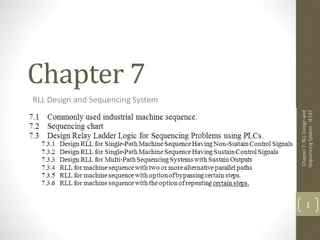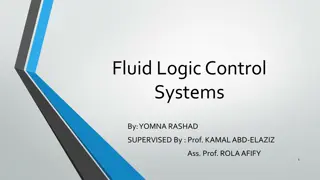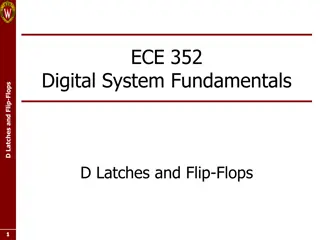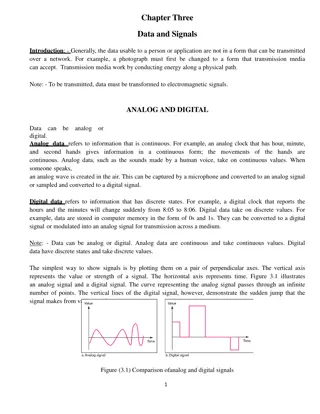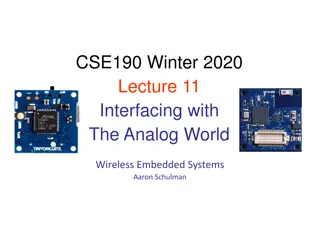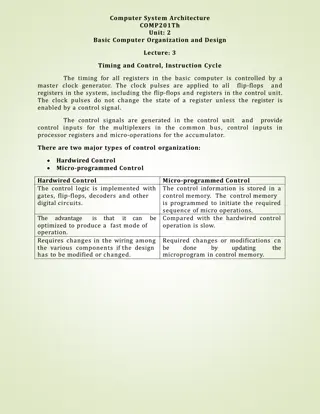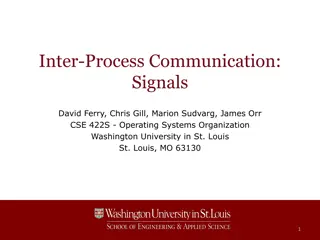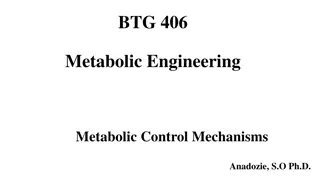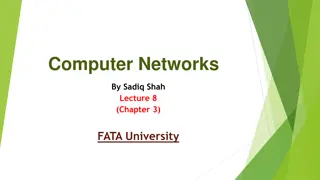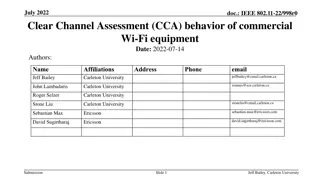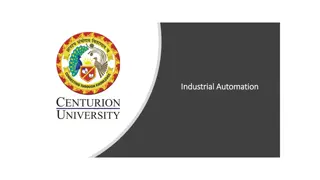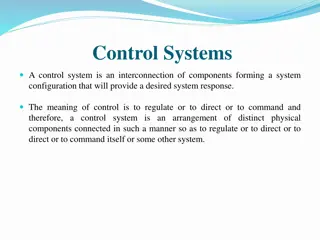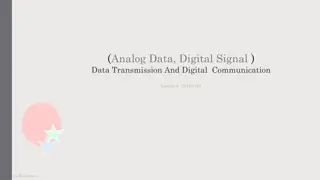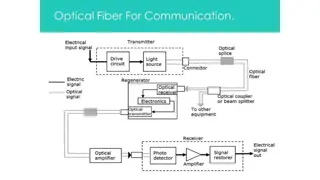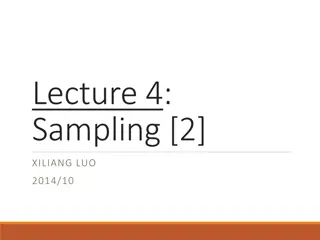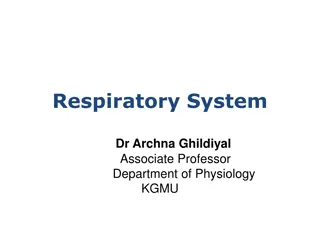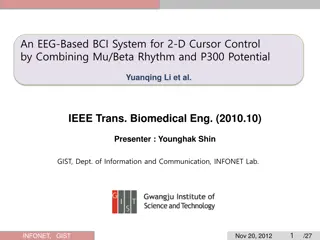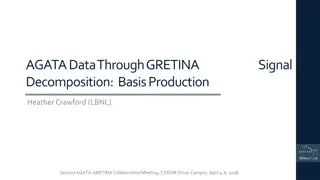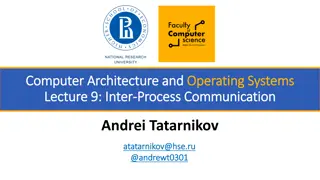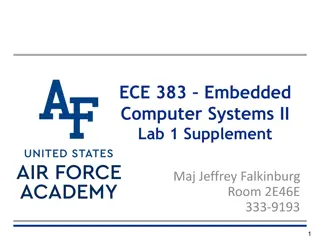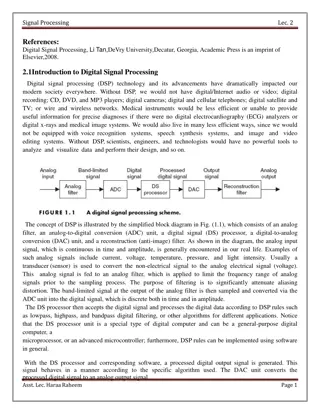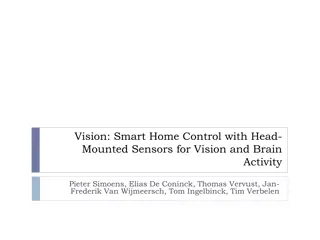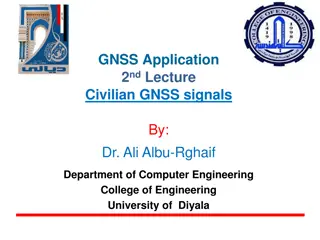Cognitive Load Classification with 2D-CNN Model in Mental Arithmetic Task
Cognitive load is crucial in assessing mental effort in tasks. This paper discusses using EEG signals and a 2D-CNN model to classify cognitive load during mental arithmetic tasks, aiming to optimize performance. EEG signals help evaluate mental workload, although they can be sensitive to noise. The
0 views • 19 slides
Pest control in Kolkata
Are you looking for professional pest control services in Kolkata? Socspl.com is here to provide the most reliable and efficient pest control services in Kolkata. We have extensive knowledge and experience in handling all kinds of pest infestations such as termite control, cockroach control, ant con
1 views • 8 slides
RLL Design and Sequencing System Overview
Common industrial sequences in RLL design and sequencing systems involve single path or multi-path approaches. Control signals can be sustain or non-sustain, impacting the system's memory. Sequence charts help visualize system operations, aiding in RLL design. Techniques like the CASCADE method are
13 views • 24 slides
Understanding Telecommunications Transmission Systems
Transmission systems in telecommunications provide circuits between network nodes using channels for bidirectional communication. Channels can range from simple audio circuits to complex satellite systems. Signals can be analog or digital, each with its unique characteristics. Bandwidth is crucial f
0 views • 32 slides
Introduction to Fluid Logic Control Systems
Fluid logic control systems utilize devices that switch fluid, like air, between outlets, providing ON/OFF outputs swiftly based on control signals. This article explores moving-part logic devices, control functions, Boolean algebra applications in control technology, and advantages of fluid logic s
1 views • 22 slides
Understanding D Latches and Flip-Flops in Digital Systems
Digital systems rely on storage elements like D latches and flip-flops to store key information from the past. These structures can hold values of 1 or 0 based on certain control signals, ensuring deterministic behavior. Clock signals are essential for regulating when these storage elements can upda
0 views • 15 slides
Understanding Data and Signals in Networks
Data transmission involves converting information into electromagnetic signals for communication. Analog data is continuous, like a clock's hands, while digital data is discrete, like binary code in computer memory. Signals can be analog or digital, periodic or non-periodic, with characteristics lik
0 views • 17 slides
Interfacing with Analog Signals in Embedded Systems
Exploring the conversion of analog signals from the physical world into electrical signals using transducers in embedded systems. Learn about going from analog to digital representation, choosing sample rates, the Shannon-Nyquist sampling theorem, importance of anti-aliasing filters, and the necessi
0 views • 18 slides
Processor Control Unit and ALU Implementation Overview
In Chapter 4, the processor's control unit and ALU are detailed in a simple implementation scheme. The ALU performs operations based on opcode values, while the control unit provides signals for various functions such as load/store, compare, and branch. Decoding techniques and control signal generat
1 views • 21 slides
Asian Pest Control - Professional Pest Management Services in Dhaka
Asian Pest Control offers top-quality pest control services in Dhaka, with a mission to be recognized as the best in the industry. Their highly trained professionals prioritize safety and environmental care while providing services like cockroach control, rodent control, snake repellent, lizard cont
1 views • 16 slides
Basic Computer Organization and Design - Timing and Control
The timing of all registers in a basic computer is governed by a master clock generator, with clock pulses controlling the flip-flops and registers in the system. Two main types of control organization are Hardwired Control and Micro-programmed Control. The former uses digital circuitry like gates a
1 views • 4 slides
Understanding Inter-Process Communication Signals in Operating Systems
Signals in inter-process communication are asynchronous notifications delivered to specific processes, allowing event-based programming. Processes can handle signal delivery by ignoring it, terminating, or invoking a signal handler. Signal handlers can be written in two ways - one handler for many s
0 views • 21 slides
Understanding Metabolic Control Mechanisms in Cellular Regulation
Metabolic control mechanisms play a crucial role in maintaining homeostasis within cells by regulating metabolic pathways. This involves finely adjusting the output of pathways in response to external signals, ensuring the proper flux of metabolites to meet cellular needs. Pacemaker enzymes, such as
1 views • 17 slides
Understanding Bandwidth and Digital Signals in Computer Networks
Exploring the concept of bandwidth in computer networks, which refers to the range of frequencies in a signal, and delving into the decomposition of signals into simple sine waves using tools. Additionally, the discussion covers digital signals, their representation, and the transmission of informat
1 views • 14 slides
Clear Channel Assessment (CCA) Behavior of Commercial Wi-Fi Equipment
This document, dated July 2022, delves into the Clear Channel Assessment (CCA) behavior of commercial Wi-Fi equipment in response to Narrowband Frequency Hopping (NB FH) signals. It explores the regulatory framework around license-exempt frequency bands in the USA and Europe, highlighting the specif
0 views • 22 slides
Understanding Industrial Automation Components and Sensors
Explore the world of industrial automation through field instruments, control hardware, and advanced technology like SCADA software and smart transmitters. Learn about widely used sensors in automation, leading manufacturers, and control hardware such as PLCs and distributed control systems. Dive in
2 views • 8 slides
Understanding Control Systems for Desired System Response
A control system is an interconnection of components that regulate, direct, or command a system's response. It consists of plant, feedback, controller, and error detector components. The plant is the unit to be controlled, feedback allows automatic correction, the error detector compares inputs, and
2 views • 10 slides
Understanding Marketing Control and Its Importance in Business
Marketing control is a crucial process for firms to evaluate the impact of their marketing strategies and initiatives, making necessary adjustments for better outcomes. It involves various aspects such as annual plan control, profitability control, efficiency control, and strategic control. The proc
0 views • 20 slides
Understanding Analog Data and Digital Signal Transmission
This lecture delves into the concepts of analog data, digital signals, and the processes involved in data transmission and digital communication. It covers topics such as Pulse Amplitude Modulation (PAM), Analog-to-Digital Conversion, and Sampling. The conversion of analog signals to digital signals
0 views • 34 slides
Overview of Point-to-Point Fiber Optic Communication System
Point-to-point fiber optic communication systems involve converting voice signals from a microphone into digital signals using a coder, transmitting light signals through a semiconductor diode laser over optical fibers, and decoding the signals back to analog for sound production. The system offers
0 views • 11 slides
Understanding Pipelined Control in Processor Architecture
Explore the intricacies of pipelined control in processor design, detailing the control signals required at each stage of the pipeline. Learn about data hazards, forwarding, and stalling techniques to ensure efficient instruction execution. Dive into the concept of optimized control values for strea
0 views • 16 slides
Understanding Control Plans in Process Management
A Control Plan is vital in controlling risks identified in the FMEA process, focusing on process and product characteristics, customer requirements, and establishing reaction plans for out-of-control conditions. It serves as a central document for communicating control methods and includes key infor
1 views • 20 slides
TV Ads Signalling Success: Driving Strong Fitness, Trust, and Popularity Signals
TV ads play a crucial role in signaling success by driving strong fitness, social, trust, quality, confidence, and popularity signals among adults. The strength of these signals varies across different media channels, with television emerging as a powerful platform for engaging audiences. Fitness an
15 views • 14 slides
Understanding Sampling and Signal Processing Fundamentals
Sampling plays a crucial role in converting continuous-time signals into discrete-time signals for processing. This lecture covers periodic sampling, ideal sampling, Fourier transforms, Nyquist-Shannon sampling, and the processing of band-limited signals. It delves into the relationship between peri
1 views • 60 slides
Understanding Neural Control of Respiration in the Respiratory System
The lecture discusses the regulation of respiration, focusing on the neural control of breathing rhythm, ramp signals, lung receptors, and the role of different groups of neurons in the respiratory center. Key topics include inspiratory ramp signals, controlling the rate of respiration, and the func
0 views • 35 slides
Understanding Fly-By-Wire (FBW) Systems in Aircraft
Fly-By-Wire (FBW) is a revolutionary system that replaces traditional manual flight controls with electronic interfaces in aircraft, enhancing safety and performance. It converts pilot inputs into electronic signals, allowing for automatic functions and precise control. This system involves complex
2 views • 5 slides
Deconvolving Snow Cover and Snowfall Passive Microwave Signals
This research focuses on deconvolving snow cover and snowfall passive microwave signals using GPM data. The study employs a data-driven approach to estimate snowfall using a nested K-nearest algorithm and observed irregularities. By analyzing variations in brightness temperatures (Tbs) over snow-cov
0 views • 9 slides
EEG-Based BCI System for 2-D Cursor Control Combining Mu/Beta Rhythm and P300 Potential
Brain-computer interfaces (BCIs) offer a pathway to translate brain activities into computer control signals. This paper presents a novel approach for 2-D cursor control using EEG signals, combining the Mu/Beta rhythm and P300 potential. By simultaneously detecting two brain signals, P300 and motor
0 views • 27 slides
Effective Strategies for Locational Signals in Renewable Energy Projects
Locational signals play a crucial role in steering renewable energy project constructions to specific areas, aiding in grid optimization and resource utilization. Strategies like bid bonuses, penalties, and maximum capacity quotas help manage integration challenges and ensure sustainable deployment
0 views • 17 slides
Basis Production Procedure for AGATA through GRETINA Signal Decomposition
This presentation outlines the detailed procedure for generating basis signals in the context of AGATA data processed through GRETINA signal decomposition. It covers the generation of pristine basis signals, superpulse analysis, and the creation of cross-talk corrected basis files. The process invol
0 views • 19 slides
Understanding Inter-Process Communication in Computer Architecture
Explore the key concepts of Inter-Process Communication (IPC) in computer architecture, covering topics such as signals, message queues, shared memory, and handling signals. Learn how to send and handle signals, manage never-ending programs, and control processes using utilities like kill. Dive into
0 views • 20 slides
Embedded Computer Systems Lab 1: VGA Module Overview
This document provides an overview of Lab 1 for Embedded Computer Systems II, focusing on the VGA module and its functionalities. It includes details about the VGA module entity, its ports, clock signals, trigger voltage and time representation, channel signals, color intensities, row and column val
0 views • 18 slides
Volleyball Referee Hand Signals for Common Violations
Learn the essential hand signals used by volleyball referees to indicate common violations during a game. Signals include illegal alignment, line violation, illegal hit, delay of service, over the net, net foul, legal back row attack, illegal attack of serve back row attack, and illegal block/screen
0 views • 26 slides
Understanding Inter-Process Communication Signals in Operating Systems
Signals in operating systems play a critical role in facilitating asynchronous notifications between processes. They allow for event-based programming and are conceptually similar to hardware interrupts and exceptions. Processes can handle signal delivery by ignoring it, terminating, or invoking a s
0 views • 24 slides
Understanding Digital Signal Processing in Modern Society
Digital Signal Processing (DSP) technology has revolutionized modern society by enabling advancements in areas such as audio, video, communication, medical diagnostics, image processing, and data analysis. This technology involves converting analog signals to digital, applying digital algorithms for
0 views • 4 slides
Smart Home Control with Head-Mounted Sensors
Wearable ubiquitous computers like smart glasses and neuro-headsets are utilized to achieve ubiquitous computing in smart homes. A vision system is proposed that combines visual cues and cognitive signals to enable users to control household objects using brain activity. The prototype integrates cam
0 views • 8 slides
Effective Regulation of Active Power in Renewable Energy Sources
The balance between generation and load is crucial in power systems operation. Various control levels ensure this balance, from frequency control to power station planning. DER units may lack control means, but specific configurations allow for frequency and voltage control. Performance indicators a
0 views • 51 slides
Civilian GNSS Signals Overview: GPS, GLONASS, Galileo
An insightful lecture on civilian GNSS signals by Dr. Ali Albu-Rghaif covers GPS, GLONASS, and Galileo signals. The content delves into GPS signal modulation, generation, receiving, and demodulation processes, highlighting the carrier wave, navigation data, and spreading sequences. It also discusses
0 views • 20 slides
Understanding Barrel Shifter in CPU Design
Barrel shifter is a vital component in CPU architecture, enabling shifting and rotating operations on data inputs based on control signals. The shifter consists of two main blocks - Shift-and-Rotate Array (SARA) and Control Logic. SARA, designed with multiple stages of cells, executes shift and rota
0 views • 12 slides
Understanding Control Plans in Process Management
Control plans are essential tools for managing process risks and ensuring quality control. They focus on controlling process and product characteristics, meeting customer requirements, and having reaction plans in place. A control plan contains key information such as control factors, specifications
0 views • 20 slides


